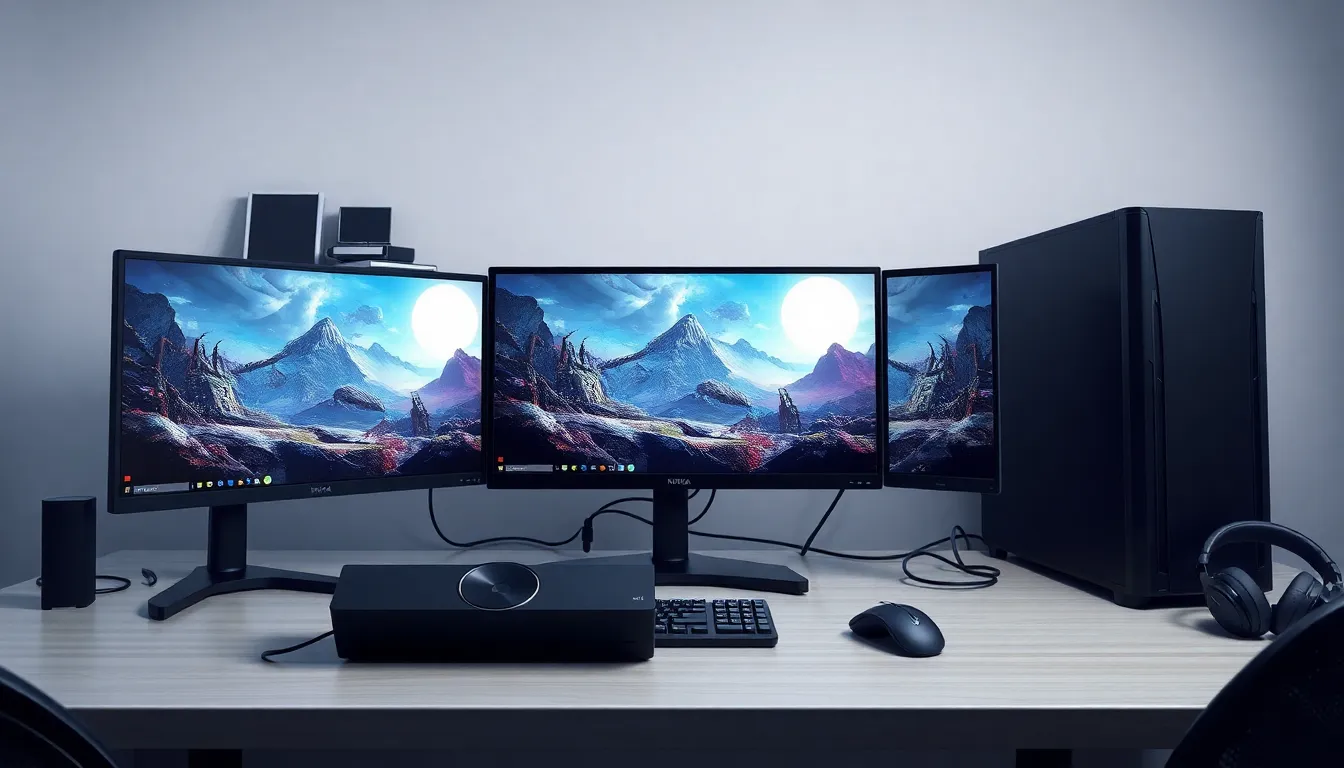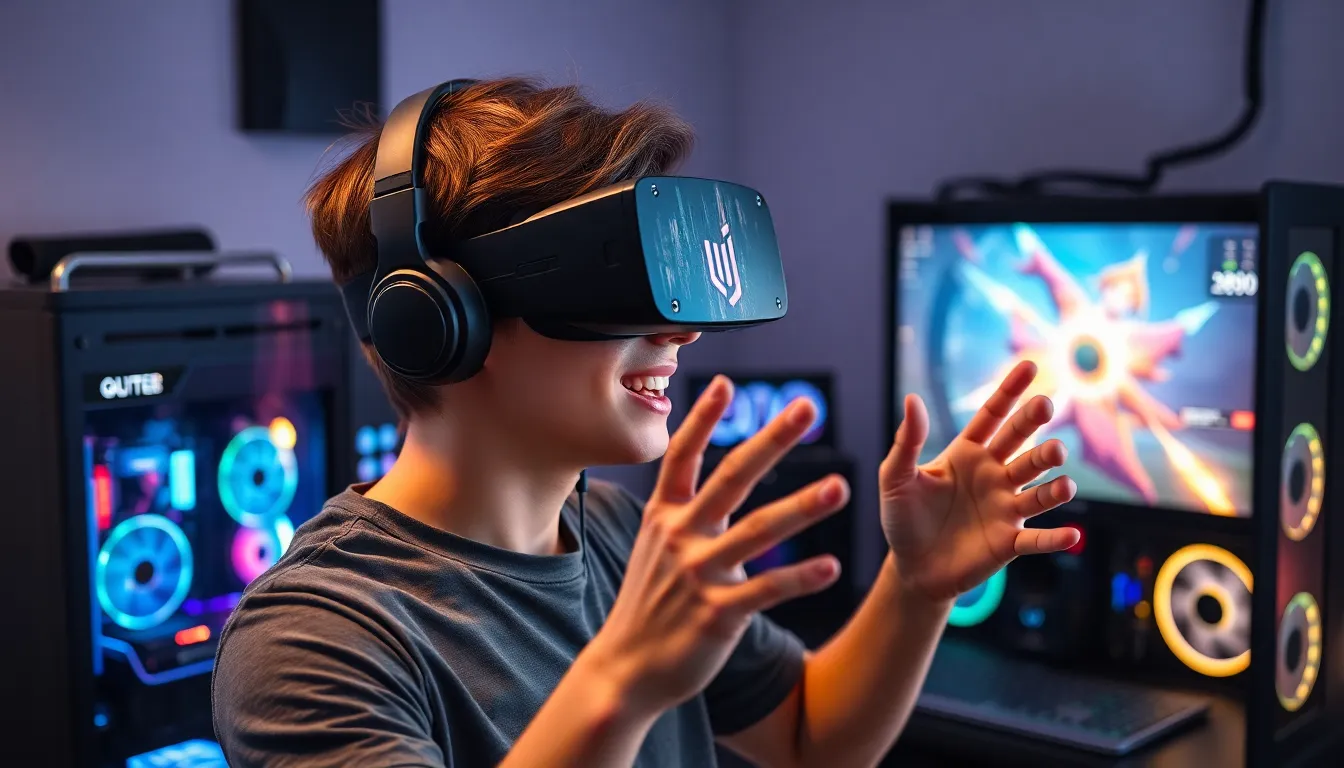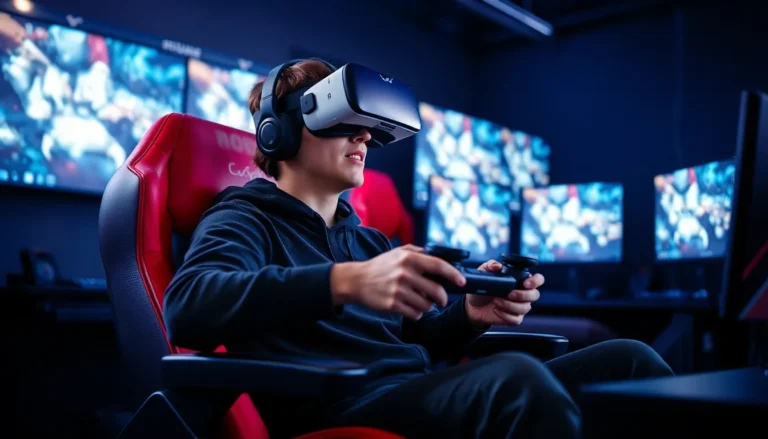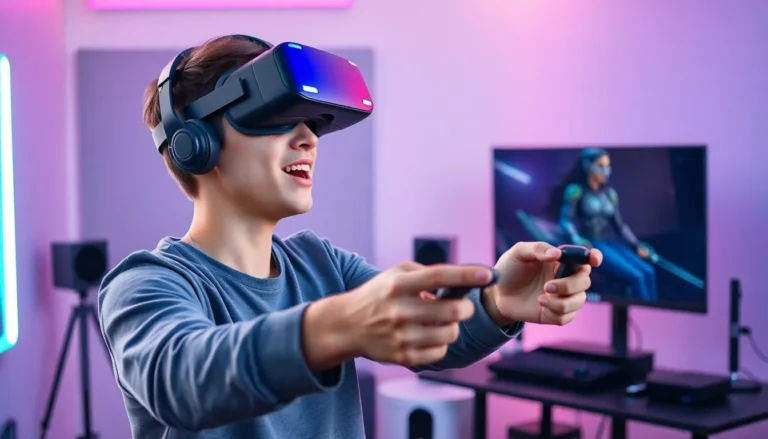In a world where gaming is no longer just a pastime but an immersive experience, having a VR-ready gaming PC is like owning a magic portal to alternate realities. Imagine donning a headset and finding yourself in a dragon’s lair or racing through futuristic cities—all from the comfort of your couch. It’s not just gaming; it’s a full-body adventure, minus the sweat and questionable snacks.
Table of Contents
ToggleWhat Is a VR Ready Gaming PC?
A VR ready gaming PC meets specific hardware requirements essential for an immersive virtual reality experience. High-performance graphics cards, such as the NVIDIA GeForce RTX series or AMD Radeon RX series, enable stunning visuals and 60 frames per second playback, crucial for smooth motion in VR.
Powerful processors, like Intel Core i7 or AMD Ryzen 7, play a significant role in managing demanding applications while allowing for efficient multitasking. Additionally, having at least 16GB of RAM ensures seamless performance across various tasks, contributing to overall system stability during gameplay.
Storage is also important; SSDs provide faster load times compared to traditional HDDs. A minimum of 512GB SSD storage competently handles VR game installations, updates, and software applications.
Moreover, a VR headset requires compatible connectivity options, emphasizing the need for DisplayPort or HDMI outputs on the PC. USB ports are equally essential for tracking sensors and controllers that enhance the VR experience.
A quality VR ready gaming PC also incorporates adequate cooling systems. Efficient cooling prevents overheating during long gaming sessions, ensuring reliable performance over time.
Lastly, an optimized VR gaming setup includes sound capabilities. Advanced audio cards or integrated sound solutions enhance immersion, creating realistic soundscapes that transport gamers into virtual environments.
Key Components of a VR Ready Gaming PC

A VR-ready gaming PC incorporates specific components ensuring an immersive virtual reality experience. Essential elements include a powerful graphics card, a robust processor, as well as adequate memory and storage.
Graphics Card
NVIDIA and AMD produce leading graphics cards suited for VR. High-end models, such as the NVIDIA GeForce RTX 3060 or AMD Radeon RX 6700 XT, support advanced rendering techniques. Graphics cards should offer at least 6GB of VRAM to handle intricate textures and maintain high frame rates. VR requires smooth graphics, so look for cards that provide a minimum of 90 frames per second for a fluid experience. Optimal performance diminishes the chance of motion sickness, making the gaming session more enjoyable.
Processor
A capable processor significantly influences VR performance. Intel and AMD deliver options like the Intel Core i5-12600K or AMD Ryzen 5 5600X. Processing power, measured in GHz, should reach at least 3.0 GHz for a seamless experience. Having multiple cores, preferably 6 or more, enables multitasking without compromising gameplay. High-performance CPUs reduce latency, allowing gamers to immerse themselves without disruptions in the virtual environment.
Memory and Storage
Memory and storage play a pivotal role in ensuring quick access to game data. A minimum of 16GB RAM is essential for smooth performance in VR applications. Faster RAM, like DDR4 or DDR5, enhances overall responsiveness. SSDs, especially NVMe drives, provide lightning-fast load times compared to traditional HDDs, significantly improving the gaming experience. Sufficient storage, ideally 1TB or more, accommodates multiple VR titles and system requirements.
Benefits of Using a VR Ready Gaming PC
Experiencing virtual reality gaming offers unparalleled immersion. Enhanced graphics transform gaming worlds, making environments appear more lifelike. High refresh rates ensure smooth visuals, leading to improved gameplay experiences.
Robust processors facilitate complex calculations necessary for rendering virtual environments. Multi-core processors provide the power to manage multiple tasks without lag. High-performance RAM, such as 16GB or more, supports efficient data processing during gameplay.
A dedicated graphics card provides substantial advantages. Options like the NVIDIA GeForce RTX 3060 or AMD Radeon RX 6700 XT deliver stunning visuals with minimal latency. These graphic cards improve frame rates, which enhances fluidity in fast-paced games.
Solid-state drives (SSD) significantly impact load times. Quick data access through NVMe drives minimizes waiting and keeps players engaged. Instantaneous loading leads to a smoother transition between game elements, enhancing overall enjoyment.
Advanced audio capabilities add depth to the gaming experience. Surround sound systems create realistic audio environments that heighten immersion. Quality audio allows players to detect subtle sounds, contributing to situational awareness during gameplay.
Compatibility with various VR headsets expands gaming options. A VR-ready gaming PC supports headsets from leading brands, creating a diverse gaming library. Flexibility in headset choice allows players to explore various genres and titles tailored to VR.
Effective cooling systems prevent thermal throttling during extended sessions. Managing heat ensures optimal performance, prolonging the lifespan of critical components. Maintaining low temperatures enhances comfort during lengthy gaming marathons.
Investing in a VR-ready gaming PC unlocks the future of interactive entertainment. Access to cutting-edge technology delivers an unforgettable gaming experience. Engaging with complex virtual worlds provides players with excitement and adventure from the comfort of home.
How to Choose the Right VR Ready Gaming PC
Selecting the right VR-ready gaming PC requires careful consideration of various factors, especially budget and brand. Understanding these elements ensures an optimal virtual reality experience.
Budget Considerations
Budget plays a crucial role in choosing a VR-ready gaming PC. Systems start around $1,000 for entry-level gaming, but serious gamers typically invest between $1,500 and $2,500 for high performance. Graphics cards significantly influence pricing; a robust card like the NVIDIA GeForce RTX 3060 costs approximately $350. Allocate funds for essential components, including processors and cooling systems. Remember to factor in potential additional costs for accessories like VR headsets, controllers, and space requirements for gameplay. A well-planned budget supports purchasing a computer that meets both gaming needs and performance expectations.
Brand Recommendations
Opting for reputable brands can lead to reliable gaming experiences. Popular brands include ASUS, MSI, and Acer, each known for quality gaming PCs. ASUS offers high-performance systems with advanced cooling features. MSI is recognized for its powerful graphics performance, ideal for VR gaming. Acer’s Predator series provides excellent value and performance ratios. Brands like Dell and HP also manufacture solid gaming desktops with customizable options available. Choosing a reputable brand enhances the likelihood of satisfactory customer support and durable components. Prioritize those brands with a proven track record in VR gaming to ensure a dependable purchase.
Investing in a VR-ready gaming PC opens the door to a new realm of immersive gaming experiences. With the right hardware, players can dive into breathtaking worlds that push the boundaries of traditional gaming. The combination of powerful graphics cards, robust processors, and ample memory ensures smooth gameplay and stunning visuals.
As technology continues to evolve, having a capable gaming rig becomes essential for anyone looking to fully enjoy virtual reality. By choosing quality components and reputable brands, gamers can elevate their adventures and enjoy the thrill of VR from the comfort of their homes. Embracing this technology not only enhances gameplay but also sets the stage for the future of interactive entertainment.





